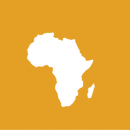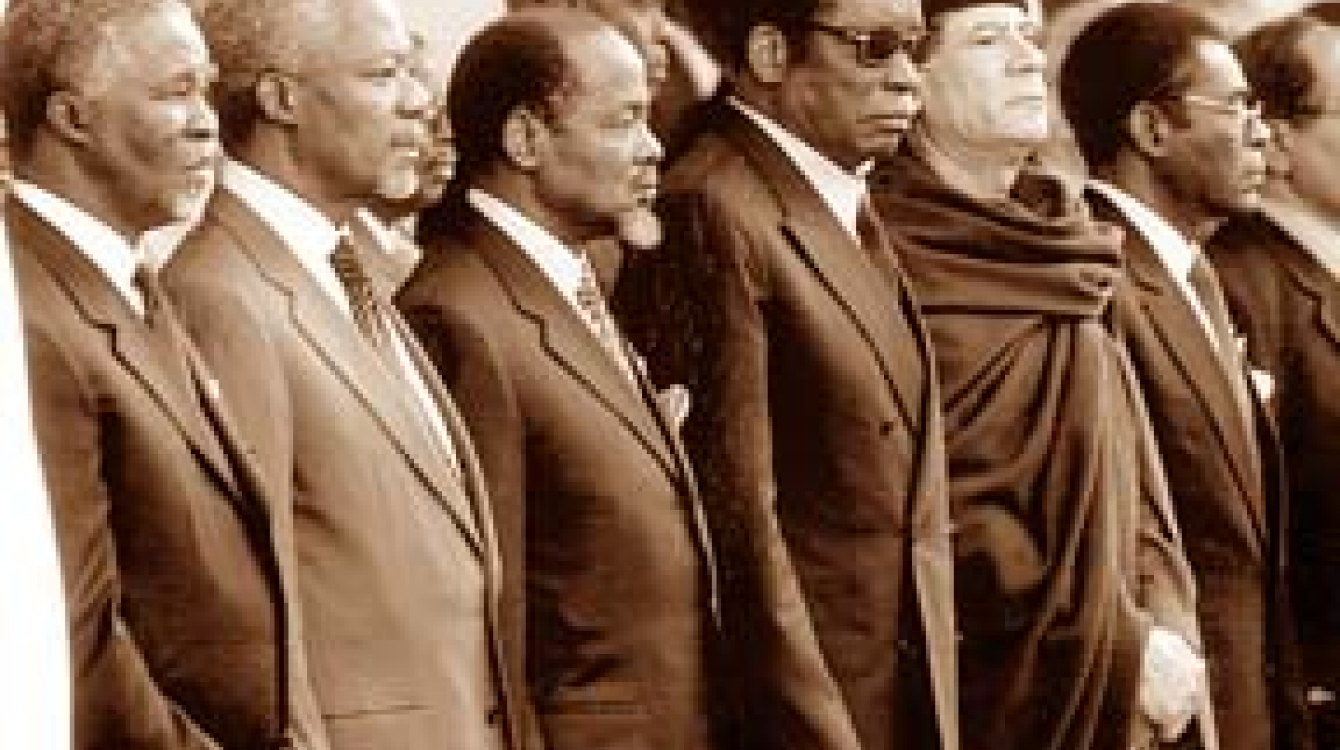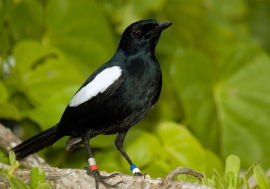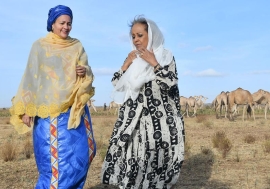The African Union is launched
The African Union is launched
Thirty-nine years after the Organization of African Unity (OAU) was launched to end colonialism and unite the peoples of Africa, the continent's leaders inaugurated its successor, the African Union, in Durban, South Africa, this July. The new organization inherits the OAU's mantle of pan-Africanism but has a broader mandate to meet the challenges of a rapidly globalizing era. "The time has come that Africa must take her rightful place in global affairs," declared South Africa's President Thabo Mbeki at the inauguration. "The time has come to end the marginalization of Africa."

At AU launch, from left:
Thabo Mbeki (South Africa), Kofi Annan (UN), Joaquim Chissano (Mozambique), Gnassingbé Eyadéma (Togo), Muammar el-Qaddafi (Libya).
Photo : ©UN / Eskinder Debebe
The OAU helped decolonize the continent, but was often criticized for failing to address many other issues, including Africa's growing poverty and fragile economies. For much of the past four decades, most OAU member governments were not democratically elected.
Increasingly, there are widespread demands "for an African Union responsible to the people of Africa, not just the states of Africa," Ms. Lalla Ben Barka, deputy executive secretary of the UN Economic Commission for Africa, told a civil society symposium before the AU launch. "They want a forceful African Union."
Large and complex
While the OAU was in principle a political organization, the AU emphasizes economic integration as the route to political unity. It is made up of all the former OAU member states. (Morocco remains outside the AU, having withdrawn from the OAU in 1984 in protest against the admission of Western Sahara, a former Spanish colony it claims as part of its territory.)
The Union expects to create 17 constituent bodies, four of which were set up at Durban: the Assembly, Commission, Executive Council and Permanent Representatives Committee.
The main decision-making organ, the Assembly of heads of state, will meet annually and President Mbeki will serve as its first chairman. Below it is the Executive Council, made up of foreign ministers. The Commission, which will oversee the day-to-day running of the AU, will comprise 10 members and, under the rules, 5 must be women. Based in Addis Ababa, Ethiopia, the Commission will be chaired on an interim basis by outgoing OAU Secretary-General Amara Essy. Finally, the Permanent Representatives Committee consists of ambassadors and other officials accredited to the AU.
In Durban, heads of state also agreed to establish a Peace and Security Council, made up of 15 nations. According to the Constitutive Act of the AU, the organization has the right to "intervene [upon decision of the Assembly] in cases of war crimes, genocide and crimes against humanity." The lack of such powers resulted in much criticism of the OAU, especially over the 1994 genocide in Rwanda. A stand-by peacekeeping force, drawn from African armies, will ultimately be established under the authority of the Security Council.
A "peer" review mechanism, whereby heads of state commit to good governance practices and regularly review each other's performance, will also be established. Its mandate and organization are not yet clear, but diplomats in Durban noted that membership would be voluntary. However, the idea has raised concerns that donor countries could use it to oversee the internal affairs of AU members.
Towards broader participation
In the future, the Union intends to set up a Pan-African Parliament in which at least one-fifth of representatives should be women. In contrast to the OAU, the AU has adopted gender equality as one of its principles. The one-fifth minimum requirement for the parliament is a significant improvement on the levels of female representation in national legislatures of many African countries. Africa is "the only continent to have made such a commitment in the mainstreaming of gender within its continent-wide body," noted the Zimbabwe Women's Resource Centre and Network.
The AU plans to eventually set up an African Court of Justice. However, an earlier proposal for an African Court on Human and People's Rights has been ratified by only a handful of nations. The powers given to any new pan-African judicial system will be critical, say civil society organizations in Africa and abroad.
The AU "will only succeed if it replaces the culture of impunity with a culture of accountability," says the Africa director of the US-based Human Rights Watch, Mr. Peter Takirambudde.
Another AU body, which civil society organizations say could broaden participation, is the Economic, Social and Cultural Council. It is expected to draw its members from non-governmental social and economic groups in member countries. The Council will be a major policy-making organ of the African Economic Community, whose creation is a long-term goal of the AU. However, the Council is still to be established, and the Assembly will determine its functions, powers and composition.
"It is regrettable that the initial emphasis was placed on the executive branches of the Union," Pan-African Movement General Secretary Tajudeen Abdul-Raheem said in Durban. "The challenge now is to identify those institutions that will give a voice to ordinary Africans."























